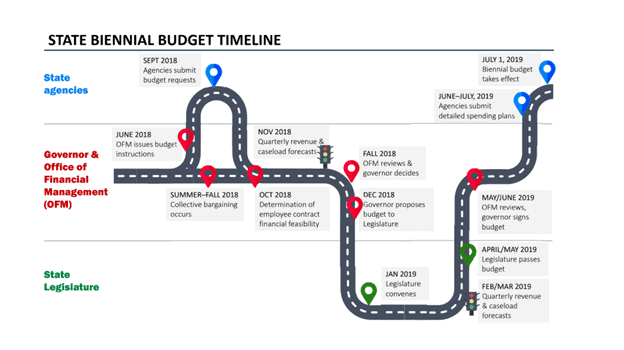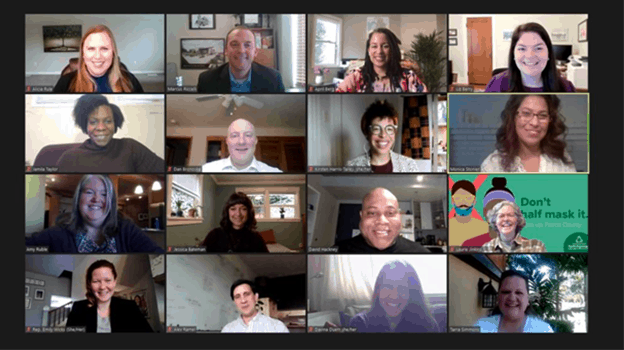Trivia Question
Do the Washington State Senate and House of Representatives take final roll call votes on bills in the same manner?
Election Results
Washington State Elections Leave Balance of Power in Olympia
Unchanged.
As a fully mail-in ballot state, it is not uncommon to see initial election night results shift as further ballots are received and counted. On election night, it appeared that House Democrats would gain some seats and Senate Democrats might as well. While there were some swaps where incumbents were unseated by members of the other party, ultimately the overall party breakdown remained the same with House Democrats maintaining a 57-41 majority and Senate Democrats maintaining a 28-21 majority (one Democrat votes with Republicans, so the effective Senate breakdown is 27-22).
Lots of New Faces “Headed” to Olympia
Over the weekend I was perusing social media and came across this picture of House Democratic leadership welcoming its new members (they held a welcome event via Zoom). This picture demonstrates that our legislature is becoming more diverse (and younger!). We look forward to working with all of the new legislators in each of the four caucuses. Bonus points for Speaker Jinkins background – she represents public health well with her background!
Come January, there will be 21 new legislators. We will see five new Senators – one new Democratic Senator and four new Republican Senators. There will be 16 new House members – 9 new Democrats and 7 new Republicans.
What’s Up Before the End of the Year
Uncertainty Continues to be the Theme for 2020
With Governor Inslee’s November 15th announcement of a four-week modified shutdown to combat the accelerating COVID crisis, the tone and
tenor is reminiscent to the early days of the pandemic. In addition to the pressing questions around hospital capacity and sufficient public health infrastructure, there is heightened discussion around the budget impacts of the pandemic (particularly with restaurants and retail largely shuttered during the holidays); if, when and how the federal government will provide relief; and how should the state provide counsel for in-person services. Further, as expected, rumors abound as to whether Governor Inslee will join the incoming Biden Administration to advance climate change. If he makes that move, that will set off dominoes, including our newly elected Lt. Governor temporarily assuming the Governor’s seat until an election could be held.
Updated Revenue Numbers Released
On November 18th, the State’s Economist Dr. Lerch provided the Washington State Economic and Revenue Forecast Council with an updated revenue forecast. The forecast came with the following caveats (2020 – the
year of the asterisk):
- The forecast is on the conservative side as it assumes there
will not be another federal stimulus, resulting in projected
lower personal income in Q4 in 2020 and Q1 in 2021 - The forecast does not reflect projected implications of the
restrictions the Governor instituted on November 16th (which
could be substantial). - It came with a general statement about continued uncertainty
due to COVID and its related economic impacts.
The potentially momentary good news is that our projected budget
gap for the remainder of this biennium and the upcoming 2021-23
biennium continues to decrease. The three-year budget gap fell from
a projected $4.2 billion in September to $3.238 billion. The shortfall for 2019-2021 (biennium we are in now) fell from $2.3 billion to $1.666 billion and the gap for 2021-23 (starts July 1, 2021) fell from $1.9 billion to $1.572 billion.
This information will inform the Governor’s budget work that is
underway and the next formal revenue forecast will occur in March –
right before the Legislature is scheduled to finalize its budget.
Legislative Committee Days Approaching
The Senate and the House will gather the week of November 30th for virtual Committee days. Committee days typically have a “first day of school feel” with legislators, lobbyists and staff gathering for a few short days together under the auspices of preparing for the next legislative session. This year the social (and fundraising) part of committee days will not be possible, so it’s like the first day of school with homework as the sole focus!
What will I be watching? There are a lot of hearings throughout the
week, but on November 30th I will definitely be tuned to TVW.org to
watch the Senate Ways and Means Committee at 2:30 and the House
Appropriations Committee at 3:30 (you can always catch-up on
missed hearings by looking at the archive button on TVW.org). Those
hearings will provide a deeper dive on fiscal matters that will influence the budget. I will be particularly watching to hear the questions from
legislators – they are always telling.
There will also be two policy committee hearings focused on child
care and COVID – the House Human Services and Early Learning
Committee is holding a work session on the issue on Tuesday,
December 1st at 1:30 p.m. and the Senate Early Learning Committee
will hold one on Friday, December 4th at 2:00 p.m.
Governor’s Proposed Budget Expected Mid-December
The visual below was developed by the Governor’s budget shop, the Office of Financial Management (OFM), to depict the budget process. As you can see, budget preparation is a year-long affair.
In September, state agencies submitted their recommendations for inclusion in the Governor’s proposed budget for the 2021-23 biennium (which runs from July 1, 2021 to June 30, 2023). These are called decision packages. Given our state’s fiscal situation, OFM issued a strict directive to not request new funding and to instead suggest areas where savings could be achieved.
Since the submission of decision packages, the staff at OFM has been reviewing the proposals and meeting with the Governor’s staff and the Governor himself to identify priorities and get direction. The revenue forecast released on Wednesday, November 18th provides additional guidance about the state’s fiscal outlook and that information informs what the Governor will propose.
Typically, the Governor releases his proposed budget in mid-December. We will get hints as the time gets closer. We can expect the Governor’s budget to be “aspirational.” He will likely propose new revenue (such as a carbon tax) and propose investments predicated upon passage of this new revenue.
The Governor’s budget is an important step in the process, but not the end of the process. Once the Governor’s budget is released, attention turns to the legislature as they prepare their response.

What do we know about the 2021 Legislative Session?
Virtual Legislative Sessions on the Horizon
Most legislative activity will be conducted virtually. Both bodies have announced that committee hearings will be virtual and, at this time, the Senate does plan to hold rolling, in-person floor sessions (with Senators being able to vote remotely if they prefer). Limited staff will be in person for support and the entire Capitol campus will be closed to the public and lobbyists. Legislators have advised managing expectations and the virtual nature will mean fewer committee hearings. Additionally, legislators have been directed to limit the number of bills they introduce.




